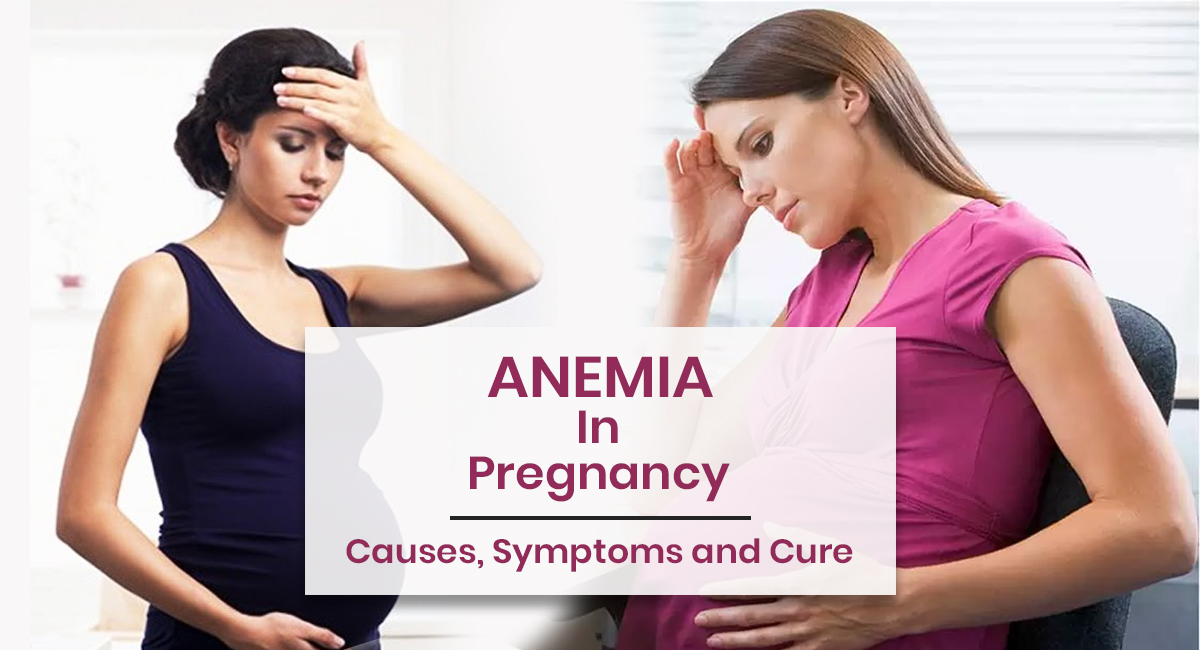Anemia is one of the common health problems in women, especially during pregnancy. It is because, during the pregnancy, the body produces more blood to support the growth of the fetus. However, if the body does not get enough of the nutrients, it is not be able to produce sufficient RBC that carries oxygen to the tissue throughout the body. Read more to know about anemia in pregnancy; it causes, symptoms, and treatment.
Table of Contents
Types and Causes of Anaemia in Pregnancy:
During pregnancy, three types of anemia can develop, which are the following:
1. Iron-deficiency Anaemia – On of the leading cause of anemia during pregnancy is because of iron deficiency, and thus, Iron deficiency anemia is one of the common anemia. During the iron deficiency, the body does not have enough iron to produce a sufficient amount of hemoglobin. Hemoglobin is the protein found in the red blood cells, which carries oxygen from the lungs to the rest of the day.
2. Folate- Deficiency Anaemia – A folate is a form of Vitamin that is found in many foods like Green leafy vegetables and others. The body needs this nutrient for the production of new cells and red blood cells. An expecting woman needs extra folate, which is not enough from the diet. When they do not get enough of the folate, it results in the deficiency, and the body stops producing RBC to transport oxygen to the tissues in the body. The only solution to this deficiency is the intake of the folic acid supplement. Folate deficiency can lead to congenital disabilities in the baby.
3. Vitamin B12 Deficiency – Vitamin B12 helps in the formation of red blood cells. When the body does not get enough of Vitamin B12, it fails to produce enough of RBC. Women who do not consume poultry, meat, dairy products, and eggs are at a higher risk of Vitamin B12 deficiency. The deficiency of Vitamin 12 could lead to preterm labor and neural tube abnormalities.
In addition to the above-listed deficiencies, loss of blood during pregnancy could also be a root cause of anemia during pregnancy.
Who is at the Higher Risk of Anaemia in Pregnancy?
Every pregnant woman who has a deficiency of iron, folate, and Vitamin 12 is on the verge of getting anemia. However, the following women are a higher risk of anemia in pregnancy.
- Women who are pregnant with more than one baby.
- Have less difference between the two deliveries.
- Women who frequently vomit due to morning sickness.
- A pregnant teenager.
- Women who have had iron deficiency before getting pregnant.
Symptoms of Anaemia in Pregnancy:
- Pale lips, skin, and nails.
- Feeling tired and weak.
- Short of breath
- Dizziness
- Rapid heartbeat
- Finding a problem in concentrating
- Chest pain
- Headache
- Cold hands and feets
Risk of Anaemia in Pregnancy:
Untreated deficiency of anemia or severe anemia can lead to the following risks.
- Low birth weight of the baby.
- Blood transfusion if there is a high amount of blood loss during the delivery.
- New Born might have anemia.
- Birth defects
- Development delay in the child.
Tips to Prevent Anaemia During Pregnancy:
The only solution to treat or prevent anemia during pregnancy is the optimum intake of all the nutrients that include iron, folate, and Vitamin B 12. Expecting women must consult her doctor before consuming multivitamins and any supplements. Here are some tips to prevent Anaemia in pregnancy:
- Consume prenatal vitamins that have iron or iron supplement (after consulting the doctor).
- Add fresh vegetables and fruits to your diet. Make sure you get enough of all the nutrients in the natural form.
- Drink juices such as orange juice, tomato juice, strawberries, that are high in Vitamins.
- Consult your doctor for the calcium intake. Calcium is necessary for the body; however, high calcium can decrease the absorption of iron.
- Add meat, eggs, and dairy products to your diet.
Foods to Treat Anaemia in pregnancy:
- Lean red meat, poultry, and fish
- Leafy, dark green vegetables
- Iron-enriched cereals and grains
- Beans, lentils, and tofu
- Nuts and seeds
- Eggs
- Citrus fruits and juices
- Strawberries
- Kiwis
- Tomatoes
- Bell Peppers
Test for Anaemia in Pregnancy:
During the first prenatal appointment, your doctor will conduct a blood test to check whether you are anemic or not. Blood tests include:
- Hemoglobin Test – This test is done to check the hemoglobin level in your body.
- Haematocrit Test – This test measures the percentage of red blood cells in the blood
In case you have normal levels of any of the following, it means you might be suffering from iron deficiency anemia. If that’s the case, your doctor will go for other blood tests to determine the iron deficiency. However, if you do not have anemia during the first trimester, your doctor would suggest you get another blood test to check the anemia.
Some Facts
- According to WHO, more than 40% of pregnant women across the world are suffering from Anaemia.
- Anemia treatments range from Vitamins to blood transfusions.
- A vegetarian diet has less iron, Vitamin B 12, and folate.
- One of the common types of anemia is iron-deficiency anemia.
Conclusion:
Anemia is one of the common health problems that is faced by pregnant women. It could be due to lack of iron, folate, Vitamin B12, and Vitamin C.
FAQs:
Anemia during pregnancy can cause a baby’s low birth weight, premature birth, and maternity mortality.
Consume foods that are rich in iron, folate, Vitamin C, and Vitamin to prevent anemia during pregnancy.
Yes, if you consume enough of Vitamins, iron, and folic acid, your anemia might go away after pregnancy.
Hemoglobin less than 7.0g/dl is considered to be severe anemia in pregnancy.




